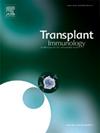Clinical application of biological agents in rheumatoid arthritis
IF 1.6
4区 医学
Q4 IMMUNOLOGY
引用次数: 0
Abstract
Rheumatoid arthritis (RA) is a chronic, systemic autoimmune disorder primarily distinguished by synovial inflammation, which, as the disease evolves, can lead to bone erosion and destruction. Consequently, the pivotal strategy in preventing joint damage and fostering functional recovery lies in the effective management of synovial inflammation. Disease-modifying antirheumatic drugs (DMARDs) and prednisone therapy remain the first-line treatments for RA. However, in instances of refractory RA, these medications may fall short in adequately controlling inflammation, and they are often accompanied by several adverse effects, including limited bioavailability, therapeutic resistance, and potentially toxic side effects. Given these challenges, the identification of targeted therapies to manage disease activity and diminish inflammation becomes imperative.Recently, biologic agents for the treatment of RA have garnered significant attention owing to their minimal side effect profile, reduced potential for drug dependence, and their precise therapeutic action directly on target cells. This review provides a comprehensive exploration of advancements in biologics that target and inhibit inflammatory cytokine receptors, specifically TNF-α, IL-6, and IL-1β, as well as B lymphocyte receptors, TLR4, nanodrugs, and Janus kinase (JAK) inhibitors in the context of RA. By providing innovative perspectives and strategies for the treatment of this condition, this review contributes to the ongoing efforts to refine and improve the therapeutic landscape for RA.
求助全文
约1分钟内获得全文
求助全文
来源期刊

Transplant immunology
医学-免疫学
CiteScore
2.10
自引率
13.30%
发文量
198
审稿时长
48 days
期刊介绍:
Transplant Immunology will publish up-to-date information on all aspects of the broad field it encompasses. The journal will be directed at (basic) scientists, tissue typers, transplant physicians and surgeons, and research and data on all immunological aspects of organ-, tissue- and (haematopoietic) stem cell transplantation are of potential interest to the readers of Transplant Immunology. Original papers, Review articles and Hypotheses will be considered for publication and submitted manuscripts will be rapidly peer-reviewed and published. They will be judged on the basis of scientific merit, originality, timeliness and quality.
 求助内容:
求助内容: 应助结果提醒方式:
应助结果提醒方式:


